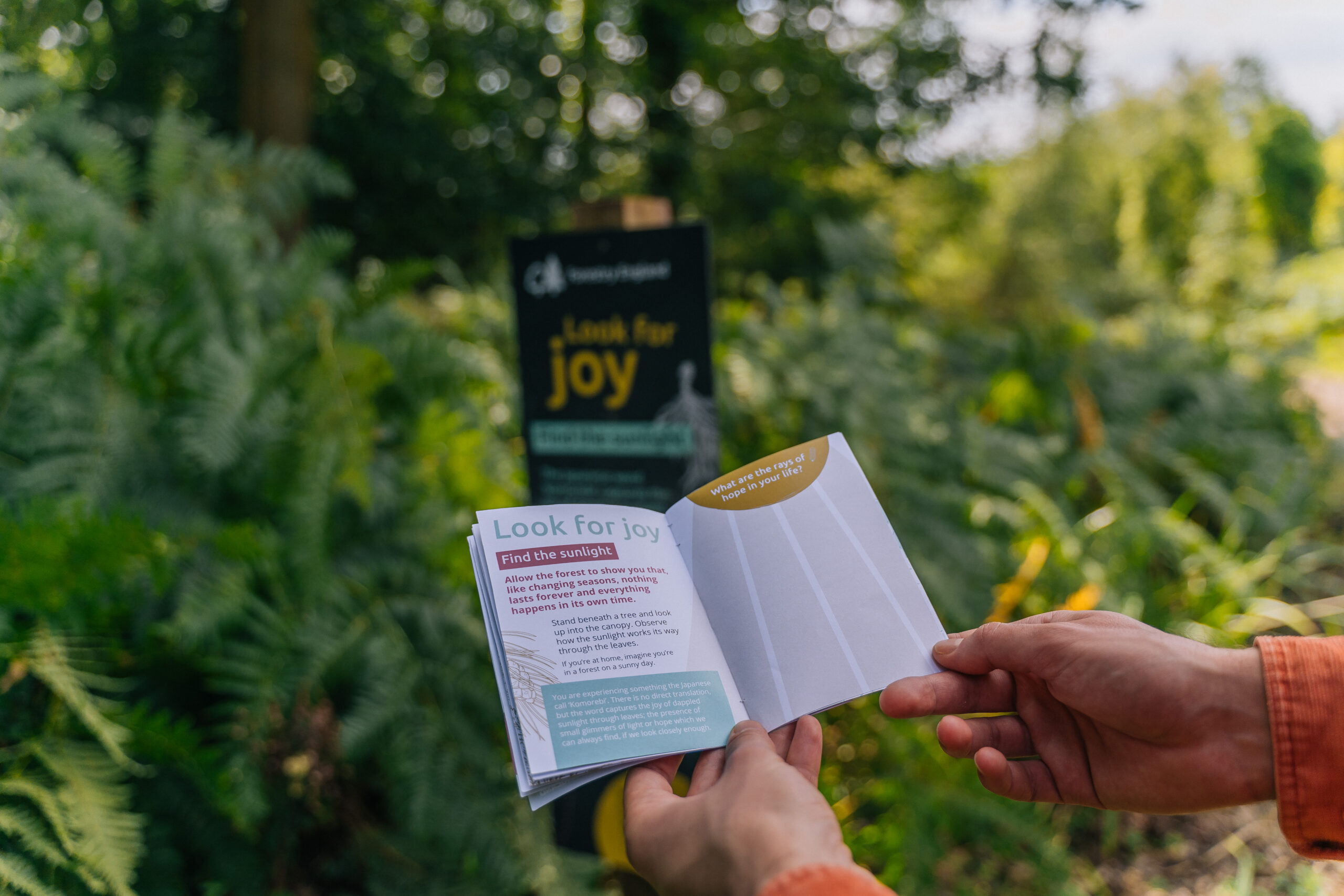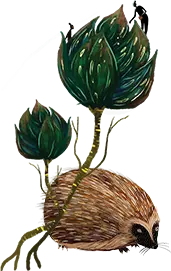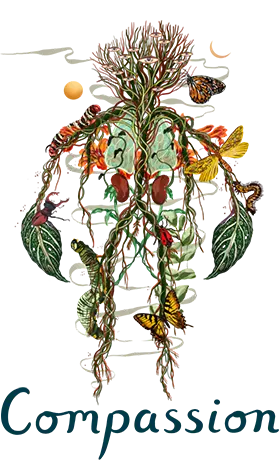
What is the Emotions pathway to Nature Connection?

The Emotions pathway is about…
Noticing the feelings that Nature inspires in us, seeking out Nature for more of these feelings, and engaging with Nature in ways that can heighten an emotional response.
Written in partnership with Carly Butler from the Nature Connectedness Research Group at University of Derby

Being in and amongst Nature can lead to a whole range of emotions – from feelings of calm and joy, to excitement, wonder and awe. Nature helps us feel good – happier and more joyful – and it also helps us feel less ‘bad’ – reducing anxiety, stress, and rumination (which is when we have repetitive and insistent thoughts about our negative mood states). The feelings of wonder and awe we experience with nature can also boost our wellbeing and lead to a sense of connection with the wider world around us.
One basis for our emotional response to Nature is a physiological one – when we are in nature, our parasympathetic nervous system is activated, which reduces stress and brings about feelings of safety and calm. As a result, we can develop a stronger emotional bond with the rest of Nature, and a deeper sense of nature connectedness.
What we then see is that those with a higher sense of nature connectedness gain more wellbeing benefits from time in Nature than those who are less connected.

While we often feel better simply by being in Nature, when we gift our attention to the more-than-human world our emotional response is heightened. By tuning into nature’s beauty, and noticing our sensory experience of the natural world, we can feel even more calm, wondrous, joyous. Nature is always available for us to turn to, to help cope with and manage our emotional journeys.
The basic element of the emotion pathway is simply to start to notice how Nature makes us feel.
Notice your emotional experiences in nature, and how this might shift from calm to joy to amazement to excitement as you pay attention to different aspects and spaces of Nature. From there you could start to turn to Nature to help manage feelings – enjoying moments in a natural space when feeling stressed, anxious or unhappy.
Sometimes it helps to see a pathway in action, which you can read more about here.

The basics
- Nature helps us feel good
- Nature helps us feel less bad
- We can turn to Nature to help us feel better, and help us manage emotions
- We can engage in Nature in ways that heighten the emotional benefits we gain from it.
- We can engage in contemplation and reflection in and about Nature to manage emotional experiences.
- Engaging with Nature in ways that activate and heighten our emotional responses can increase a sense of Nature connectedness.
- Those who have a stronger sense of nature connectedness are more likely to benefit from the effects that Nature has on our emotional wellbeing.
What the research says…
The biophilia hypothesis suggests that human beings have an innate tendency to affiliate with nature – that is, to establish a sense of emotional closeness and relationship with the rest of the natural world (Wilson, 1984).
One theory about the wellbeing benefits of nature is that it reduces feelings of stress – the Stress Reduction Theory. When we spend time in nature, we experience positive emotions, and decreased negative emotions such as fear, which can give a sense of restoration (Ulrich et al, 1991). These feelings are associated with changes in our bodies – lower blood pressure, lowered heart rate, decreased cortisol (a stress-related hormone), and less activity in the amygdala – a part of the brain associated with stress (Oh et al., 2017; Sudimac et al., 2022).

As we build up more and more experiences feeling good in nature, we begin to recognise and appreciate this benefit and may grow an emotional bond to specific natural spaces. Those who have a stronger sense of connection with nature are more likely to experienced increased positive emotions after spending moments in nature (Capaldi et al., 2015).
Nature can also help us to regulate our emotions, changing when we experience strong emotions, how long such emotions affect us, and how we experience these feelings. For instance, people may choose to visit a favorite place in nature because of how they feel in that space (Korpela et al., 2018). Being with nature can distract us from less desirable thoughts or emotions, and decrease experiences of rumination – repeated and negative thoughts that focus attention on emotional mood states (Bratman et al., 2021).

One of nature’s most powerful influences on how we feel comes through its ability to inspire a sense of awe in us. Awe is an emotion experienced when we encounter something that seems vast, or much greater than ourselves in either physical or intangible features, and is associated with feelings of wellbeing (Monroy & Keltner, 2022). Nature’s beauty, and the sense of wonder and amazement often experienced with engaging with nature, offer opportunities for awe which in turn leads to stronger feelings of connection with nature (Liu et al., 2023).
Simply tuning into how nature makes us feel can enhance wellbeing and nature connectedness – and the more intensely we experience an emotion, the greater the benefits. In one study, spending 30 minutes rating birds for how much joy they inspired led to decreased anxiety and increased nature connection (White et al., 2022). Another study found that the increase in nature connectedness experienced as a result of counting butterflies for fifteen minutes was greater amongst those who experienced stronger emotions while counting (Butler et al., 2024).
For a useful overview of nature’s effects on emotions, see Bratman, Olvera-Alvarez & Gross (2021):


Explore ‘Emotions’ pathway activities…
References
Bratman, G. N., Olvera‐Alvarez, H. A., & Gross, J. J. (2021). The affective benefits of nature exposure. Social and Personality Psychology Compass, 15(8), e12630.
Bratman, G.N., Young, G., Mehta, A., Lee Babineaux, I., Daily, G.C. & Gross, J.J. (2021) Affective Benefits of Nature Contact: The Role of Rumination. Frontiers in Psychology, 12, 643866. doi: 10.3389/fpsyg.2021.643866
Butler, C. W., Hamlin, I., Richardson, M., Lowe, M., & Fox, R. (2024). Connection for conservation: The impact of counting butterflies on nature connectedness and wellbeing in citizen scientists. Biological Conservation, 292, 110497.
Capaldi, C. A., Passmore, H.‐A., Nisbet, E. K., Zelenski, J. M., & Dopko, R. L. (2015). Flourishing in nature: A review of the benefits of connecting with nature and its application as a wellbeing intervention. International Journal of Wellbeing, 5(4). https://doi.org/10.1080/08941920.2018.1550229
Korpela, K. M., Pasanen, T., Repo, V., Hartig, T., Staats, H., Mason, M., Alves, S., Fornara, F., Marks, T., Saini, S., Scopelliti, M., Soares, A. L., Stigsdotter, U. K., & Thompson, C. W. (2018). Environmental strategies of affect regulation and their associations with subjective well‐being. Frontiers in Psychology, 9, 1–15. https://doi.org/10.3389/fpsyg.2018.00562
Liu, J., Huo, Y., Wang, J., Bai, Y., Zhao, M., & Di, M. (2023). Awe of nature and well-being: Roles of nature connectedness and powerlessness. Personality and Individual Differences, 201, 111946.
Monroy, M., & Keltner, D. (2022). Awe as a pathway to mental and physical health. Perspectives in Psychological Science, 17456916221094856. https://doi.org/10.1177/17456916221094856
Ng, S. T., Leung, A. K. Y., & Chan, S. H. M. (2023). Through the lens of a naturalist: How learning about nature promotes nature connectedness via awe. Journal of Environmental Psychology, 92, 102069.
Oh, B., Lee, K.J., Zaslawski, C., Yeung, A., Rosenthal, D., Larkey, L., et al. (2017). Health and wellbeing benefits of spending time in forests: systematic review. Environ Health Prev Med., 22, 71.
Sudimac, S., Sale, V., & Kühn, S. (2022). How nature nurtures: Amygdala activity decreases as the result of a one-hour walk in nature. Molecular psychiatry, 27(11), 4446-4452.
Ulrich R.S., Simons R.F., Losito B.D., Fiorito E., Miles M.A., & Zelson M. (1991). Stress recovery during exposure to natural and urban environments. Journal of Environmental Psychology, 11, 201–30
White, M. E., Hamlin, I., Butler, C. W., & Richardson, M. (2023). The Joy of birds: the effect of rating for joy or counting garden bird species on wellbeing, anxiety, and nature connection. Urban Ecosystems, 26(3), 755-765.
Wilson E,O. (1984) Biophilia. In Biophilia. Cambridge and London: Harvard University Press;










